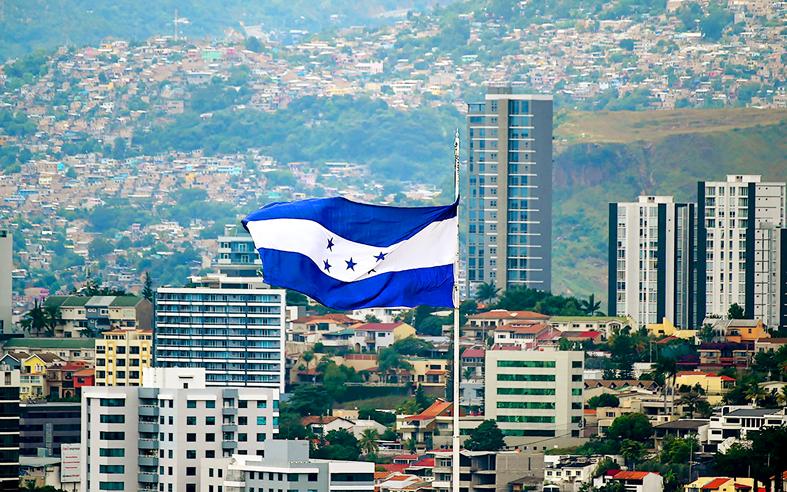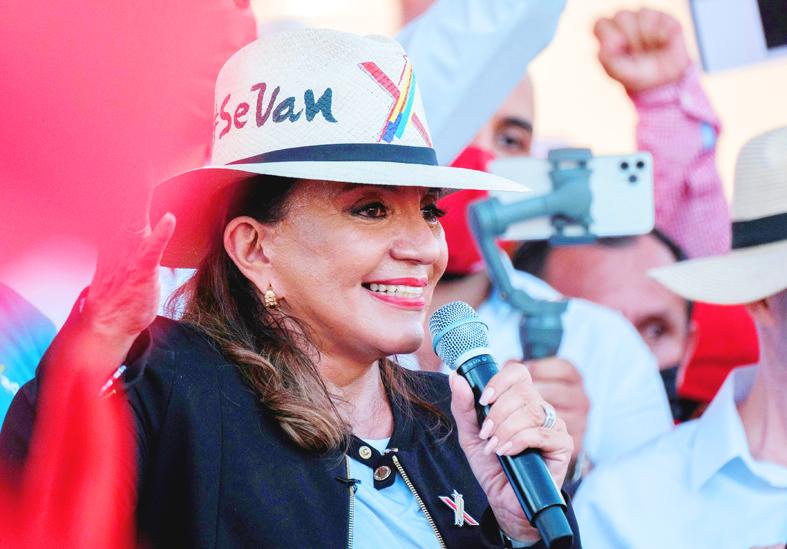Honduran presidential candidate Xiomara Castro has not made a final decision on whether to recognize China over Taiwan, a close aide said on Tuesday ahead of Sunday elections in which the question has emerged as a major issue.
Libre party candidate Castro faces the ruling National Party’s Nasry Asfura in the presidential vote, with a poll last month showing the opposition contender with a commanding double-digit lead.
“There isn’t a definitive decision,” said Hugo Noe, a Castro adviser who leads her platform-writing team.

Photo: AFP
Asfura has not taken a position on the diplomatic tug-of-war.
Honduras is one of just 15 countries that maintain formal diplomatic ties with Taiwan.
Castro, the wife of former Honduran president Manuel Zelaya, had previously said that if victorious, she would switch the Central American country’s diplomatic relations to Beijing.

Photo: Reuters
Castro’s final decision would depend on “the advantages and disadvantages that other sectors might propose,” Noe said, adding that further consultations would be carried out.
Earlier this month, Honduran President Juan Orlando Hernandez visited Taipei, expressing his desire that Honduras would continue its friendship with the nation.
China’s efforts to win over Taiwan’s remaining allies have worried the US.
“That would be one of the elements to be evaluated,” Noe said, referring to US sensitivities. “We would have to take those elements into account, because other things, like Honduran [migrants] in the United States, our trade ties, would also be at stake.”

CHAOS: Iranians took to the streets playing celebratory music after reports of Khamenei’s death on Saturday, while mourners also gathered in Tehran yesterday Iranian Supreme Leader Ayatollah Ali Khamenei was killed in a major attack on Iran launched by Israel and the US, throwing the future of the Islamic republic into doubt and raising the risk of regional instability. Iranian state television and the state-run IRNA news agency announced the 86-year-old’s death early yesterday. US President Donald Trump said it gave Iranians their “greatest chance” to “take back” their country. The announcements came after a joint US and Israeli aerial bombardment that targeted Iranian military and governmental sites. Trump said the “heavy and pinpoint bombing” would continue through the week or as long

TRUST: The KMT said it respected the US’ timing and considerations, and hoped it would continue to honor its commitments to helping Taiwan bolster its defenses and deterrence US President Donald Trump is delaying a multibillion-dollar arms sale to Taiwan to ensure his visit to Beijing is successful, a New York Times report said. The weapons sales package has stalled in the US Department of State, the report said, citing US officials it did not identify. The White House has told agencies not to push forward ahead of Trump’s meeting with Chinese President Xi Jinping (習近平), it said. The two last month held a phone call to discuss trade and geopolitical flashpoints ahead of the summit. Xi raised the Taiwan issue and urged the US to handle arms sales to

BIG SPENDERS: Foreign investors bought the most Taiwan equities since 2005, signaling confidence that an AI boom would continue to benefit chipmakers Taiwan Semiconductor Manufacturing Co’s (TSMC, 台積電) market capitalization swelled to US$2 trillion for the first time following a 4.25 percent rally in its American depositary receipts (ADR) overnight, putting the world’s biggest contract chipmaker sixth on the list of the world’s biggest companies by market capitalization, just behind Amazon.com Inc. The site CompaniesMarketcap.com ranked TSMC ahead of Saudi Aramco and Meta Platforms Inc. The Taiwanese company’s ADRs on Tuesday surged to US$385.75 on the New York Stock Exchange, as strong demand for artificial intelligence (AI) applications led to chip supply constraints and boost revenue growth to record-breaking levels. Each TSMC ADR represents

State-run CPC Corp, Taiwan (CPC, 台灣中油) yesterday said that it had confirmed on Saturday night with its liquefied natural gas (LNG) and crude oil suppliers that shipments are proceeding as scheduled and that domestic supplies remain unaffected. The CPC yesterday announced the gasoline and diesel prices will rise by NT$0.2 and NT$0.4 per liter, respectively, starting Monday, citing Middle East tensions and blizzards in the eastern United States. CPC also iterated it has been reducing the proportion of crude oil imports from the Middle East and diversifying its supply sources in the past few years in response to geopolitical risks, expanding